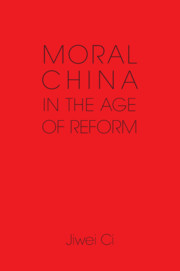Book contents
- Frontmatter
- Dedication
- Contents
- Acknowledgments
- Introduction
- 1 An Anatomy of the Moral Crisis
- 2 Political Order, Moral Disorder
- 3 Freedom as a Chinese Question
- 4 Freedom and Its Epistemological Conditions
- 5 Freedom and Identification
- 6 Neither Devotion Nor Introjection
- 7 The Insult of Poverty
- 8 Democracy as Unmistakable Reality and Uncertain Prospect
- 9 Freedom’s Unfinished Task
- 10 China’s Space of Moral Possibilities
- Index
- References
3 - Freedom as a Chinese Question
Published online by Cambridge University Press: 05 September 2014
- Frontmatter
- Dedication
- Contents
- Acknowledgments
- Introduction
- 1 An Anatomy of the Moral Crisis
- 2 Political Order, Moral Disorder
- 3 Freedom as a Chinese Question
- 4 Freedom and Its Epistemological Conditions
- 5 Freedom and Identification
- 6 Neither Devotion Nor Introjection
- 7 The Insult of Poverty
- 8 Democracy as Unmistakable Reality and Uncertain Prospect
- 9 Freedom’s Unfinished Task
- 10 China’s Space of Moral Possibilities
- Index
- References
Summary
1
It is a sad comment on the character of political discourse in our time that freedom, expressive in one form or another of a general human need under modern conditions of life, has become an increasingly debased currency through relentless ideological exploitation. This is manifest as much in the superficial criticisms of China for its supposed lack of freedom in comparison with Western societies – the latter all too often taken for granted as lands of freedom – as in the predictable retorts that China has no shortage of freedom or that too much freedom would lead to social chaos. I have no wish to join the chorus of such criticisms or to leap to China’s defense. The question worth our while is whether there is a real problem of freedom, that is, lack of freedom, as viewed from within the Chinese context and, if so, how the problem can be fruitfully formulated and approached. I believe there is, and I also believe that any reasonably open-minded approach to the problem must be free of the assumption that such a problem does not exist, or exists only to a lesser degree, in other, especially Western societies. This means, in turn, that we must work with a general understanding of freedom that steers clear of this assumption and is able to delve deeper into the nature and constitution of freedom than this assumption makes possible.
- Type
- Chapter
- Information
- Moral China in the Age of Reform , pp. 37 - 62Publisher: Cambridge University PressPrint publication year: 2014



